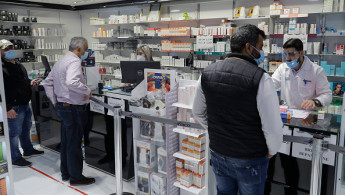Lebanon pharmacist head warns of health 'disaster' if medicine shortages continue
The head of the pharmacists' syndicate in Lebanon has warned that the country could be heading towards a "disaster" with critical shortages of crucial drugs and baby formula.
Joe Salloum said the crisis is due to a plunge in the local currency, which was exchanging between 45,300 and 45,500 liras to the US dollar on Wednesday, after surpassing a record low of 46,000 on Tuesday.
"We are heading to a health and medical disaster if the situation continues as it has for the past two days, represented by the fact that pharmacies are not receiving sufficient quantities of baby formula and medicines," Salloum said in a statement.
The crisis has reached such levels that pharmacies might have to close, the syndicate head said, calling for the speedy election of a new president to help end "temporary solutions" to drug shortages.
Lebanon has been without a head of state since Michel Aoun's term ended on 31 October due to sharp differences between rival, sectarian leaders, paralysing the government.
Medicine shortages and expensive treatment: A new crisis for Lebanese cancer patients
— The New Arab (@The_NewArab) June 8, 2022
✍ @DanaHourany https://t.co/LSF49OMyyL
"As a pharmacists syndicate, we inspect legitimate pharmacies and dispensaries and ensure adherence to good, registered medicine," said Salloum. He has previously warned about the crisis leading to chaos in the market with a fear that patients be forced to access unsafe medicine.
Pharmaceutical companies have refrained from delivering medicines and baby formula to pharmacies in light of the monetary crisis.
The Lebanese pound has lost over 90 percent of its value since the unprecedented financial and economic meltdown began in 2019.
The government gradually began lifting medication subsidies in November last year, leading to the prices of some medicines increasing fourfold and ultimately affecting the country's most vulnerable.
The crisis has left people in Lebanon forced to search multiple pharmacies to find the medication they need.





 Follow the Middle East's top stories in English at The New Arab on Google News
Follow the Middle East's top stories in English at The New Arab on Google News
![Both Hamas and the Palestinian Authority welcomed the ICC arrest warrants [Getty]](/sites/default/files/styles/image_330x185/public/2024-11/GettyImages-2178351173.jpg?h=199d8c1f&itok=TV858iVg)

